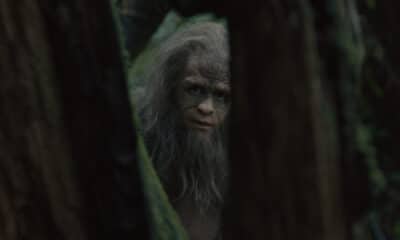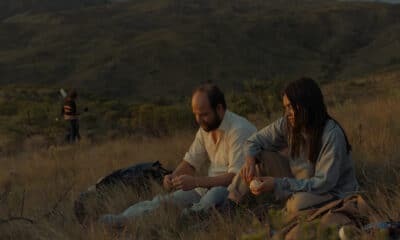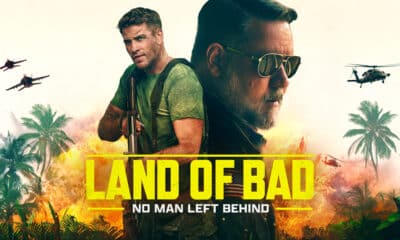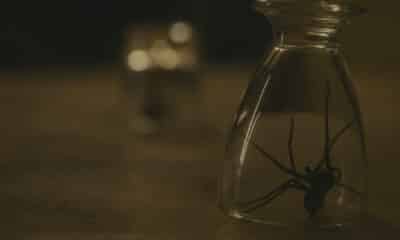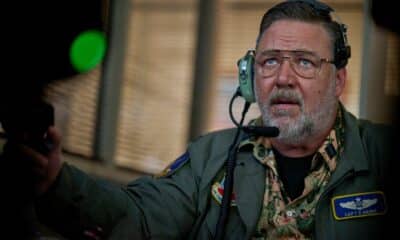A leading role in a film directed by an Oscar winner. A dream gig for any actor, but for comparative unknown Kiki Layne and up-coming Stephan James, it was a double dream. Because the director was Barry Jenkins and the film was If Beale Street Could Talk, which is released in cinemas this Friday.

KiKi Layne as Tish and Stephan James as Fonny star in Barry Jenkins’ IF BEALE STREET COULD TALK, an Annapurna Pictures release.
Nominated for three Oscars and another two BAFTAs, Jenkins’ follow-up after his award winning Moonlight has been lavished with critical acclaim. Based on the novel of the same name by James Baldwin, it’s the story of childhood sweethearts Tish (Layne) and Fonny (James), who live in 1970s Harlem and are planning a life together, despite difficulties in finding a home. Tish discovers she is pregnant but their celebrations are short lived because, at much the same time, Fonny is put in prison for rape, a crime he didn’t commit. Tish is faced with a desperate fight to prove his innocence and bring their new family together.
Talking to THN’s Freda Cooper, Kiki Layne recalls how she got the part purely through helping out a friend – and then thought the crucial phone call from Jenkins was a hoax. Stephan James, on the other hand, reveals that as soon as he heard about the role of Fonny, his determination to persuade Jenkins that he was the right person for the part knew no bounds. And both talk at length about their experience of working with the director.
Read the interviews in full below and read our review of the film here.

Stephan James as Fonny and KiKi Layne as Tish star in Barry Jenkins’ IF BEALE STREET COULD TALK, an Annapurna Pictures release.
Kiki Layne (Tish)
You are a new face on our screens, and this is very much your breakthrough role, so how did you come to get the part?
Well, one of my friends was auditioning for the role of Foni and he thought I would be great as his reader for his tape – reading the role of Tish. So, I ended up helping him out but then in the process of helping him I’m thinking to myself ‘wait, how do I get to audition for this?’ It wasn’t until a couple of weeks later that I was able to submit my own tape once I had found representation in L.A. Then, after submitting my tape, the next step for me was the chemistry read in New York with Stephan who had already been cast – and then I was put in a movie.
So, how did you react when you realised that you would be directed by Barry Jenkins?
Barry called me himself to tell me that I booked the part. It was funny because he woke me and calls me, and of course it’s a number I don’t recognise, so I don’t answer the first time. But then he calls again, and I finally pick up and he just starts to talk and doesn’t introduce himself – making fun of me because I was asleep, and then finally I put it together that him and he says, ‘hey, yes it’s Barry. I just wanted to tell you myself that you got the part.’ I was filled with so many emotions, just so very thankful and, of course, excited that I knew what this would mean for my career, but then I also wanted to get him off the phone so I could really scream, cry and call my mom, and lose my mind!
Starts don’t get much better than that really, do they? What did you know about the book and what did you know about James Baldwin?
Well, Baldwin I only knew from online content, like his speeches and interview that you can find online, but I had not read any of his novels yet. ‘Beale Street’ was the first novel that I read of his in preparation for my chemistry read. I knew the project was going to be special just seeing ‘James Baldwin and Barry Jenkins’, but then, once I had read ‘Beale Street’ and see what is a really beautiful love story, but because it’s James Baldwin he, of course, is going to speak up and out about real issues and real injustices that people are facing. I thought it was amazing how those two things came together in the novel and just fit together so wonderfully – it made it more special to me for the opportunity to be a part of the project.
Was there anything that made you, when you were reading the book, identify with you character Tish?
What’s funny is that me and Tish are so very different and I had to learn that her way of strength isn’t the go-to way of how I see strength in my mind, so I definitely actually learned a lot from Tish about the power of being that vulnerable, being that open and loving that hard, and that there’s so much strength in that.
Did that make it easier as an actress or more difficult?
It was definitely a challenge, because I naturally have – I’m just not that open and so I come off a lot more like ‘I’m going to take care of everything myself’ which with Tish she has all of this love around her and uses it, you know? She leans into in and in that finds all of this strength to stand up to herself, and I thought that was so powerful – something that I am so thankful to have learned.
You mentioned your chemistry read with Stephan and, of course, Foni’s relationship with Tish is absolutely central to the story. Did you have a rapport together to start with, or what it something that you had to work on?
No, we had to figure it out in the moment because we didn’t have any rehearsals, but thankfully they set-up the schedule in a really great way where our first week was a bunch of exterior shots, us holding hands – really cute stuff, and so it gave Steph and I time to develop our own personal friendship to prepare us to better handle those tougher scenes that were coming a little later in the production schedule. Ultimately, I think that there is chemistry all the way around this cast – not only between Stephan and I, but all these amazing actors that were put together. I think it all starts with our commitment to the work and knowing that to best serve this story we were going to have to be open and vulnerable with each other in ways which otherwise may feel a little off, to do it that quickly, but we had to be willing to go there because the story requires it, and we want to do right by this story.
It is very much and ensemble piece, as well as Tish and Foni’s story. You touched on the family side of things – Tish’s family is very strong and in contrast to Foni’s. I wondered if there was anything in your own background that you were able to draw on when you came to start playing the part.
Yes, definitely. A huge thing that I drew on was my relationship with my mom and what a strong sense of support that has been for me. Then also thinking about my relationship with my big brothers and leaning in to what did that feel like growing up with these two strong men, looking after me but also poking fun, just like you see Ernestine do in the movie. So, what does that sibling relationship look like? I definitely pulled from that.
What was it like working with Barry Jenkins after he woke you up?
It was amazing. He such a great listener. He’s so patient and so respectful to all of us as individual artists. I think he paid a lot of attention to what each of us needed individually. I’m so thankful because he gave me the space to try new things and the space to make mistakes and to learn things. It was amazing to work with him.
Do you think that patience helped particularly because some of the other members of the cast are comparatively new?
Absolutely, but that same patience he extended to everyone. That’s not even the cast, it was the crew – everyone he extends that same patience and same warmth to, which then created a really warm and safe environment overall for all of us.
With the film having already come out in the States, I’m assuming you’ve seen the poster which is you and Stephan. What does it feel like when you see a poster that actually features you and one other person.
It’s amazing. Every time I see it, I’m like ‘wow, I’m in a movie… like a really big and special movie, and people are about to see it.’ It makes me so excited.
It’s a very special movie and it has already had a lot of award nominations. You had one personally. How does it feel to be in a film that has had a such a huge response and such a positive response?
It feels great. Especially with the themes that are in the film. It’s wonderful to hear that it is being so well received and so appreciated. It’s definitely a beautiful lve story but it also has some real things to say about real issues, so to know that people are receiving that, I hope are feeling moved in some way by that. It’s wonderful.

Stephan James stars as Fonny in Barry Jenkins’ IF BEALE STREET COULD TALK, an Annapurna Pictures release.
Stephan James (Foni)
Yours is quite a familiar face as we’ve seen you in Race and Selma. They are films that pose quite powerful questions about race and about equality. ‘Beale Street’ does the same but on a more intimate scale. I wondered how much that was the appeal of the project for?
Certainly. You look at James Baldwin and Barry Jenkins and it’s had not to be excited at that marriage. I think you look at the fact, to me, this story, at the core of itself, struck me as a love story. It didn’t strike me as political, though I’m sure there’s aspects of it that are. Certainly, Baldwin speaks of social injustices but really it was deeply rooted in this love story, this incredible love story. That was the most appealing part about it.
How much did you about Baldwin’s work before you came to work on the film?
Not very well. I knew Baldwin as a poet and as an activist. I did Selma so I realised his part in the civil rights movement, but I hadn’t read any of his books. So, when I read Barry’s screenplay for the first time, I went back and read the book and consequently, when making the film, I must have read the book three or four times.
When you were reading the book, was their anything about Foni’s character that spoke to you? Did you see any similarities between you and him?
Yes, I think you look at the fact that he’s an artist – a young, black artist like myself – a sculptor. He’s deeply emotional, deeply vulnerable, thoughtful. I think those things are all true of myself as well. Also, just being a black man in the world today, and understanding the way the system has been unfairly set towards and as a result of which we just move in life differently. So, I was able to take that and bring it to Foni.
Even though the book is 45 years old, it still spoke to you in that way?
Yes, absolutely. These issues – false imprisonment, mass incarceration, they still exist – probably at a higher level today. It’s front page news. I guess it’s the unfortunate, timelessness of Baldwin that those issues till exist and he wrote then about them so long ago, sort of knowing. Maybe he hoped for something better and we all hope for something better, but that’s why it’s important not to let stories like this just fade away. To me, we couldn’t have picked a better time to make a film like this.
So, how did the part come your way in the first place?
I had been a big fan of Barry Jenkins for a while and I sort of put it out to the universe that I was going to work with him. I didn’t know when it was going to be. I get this call that Barry Jenkins is making this new film, and I thought to myself, this is kinds weird, I’ve just put this to the universe. It’s going to be a cool film but maybe there’s nothing in there for me, so when I read the description and when I read the screenplay, I had never thought that something had not been more written for me than Foni in ‘Beale Street’. Ever, in life. I told my people that. I asked if Barry would meet me for lunch, and he agreed, much to my surprise. We sat down, we had lunch. He talked to me about the film he was trying to make, the story he wanted to tell. I think that although he had been familiar with me and my work, I don’t know that he saw me as Foni? But I was happy that he engaged me anyway and decided to take this lunch, but I also wasn’t willing to leave the lunch until I thought I have convinced him that it could be me. So, it was a lot of me convincing him, or trying to convince him, and then after that lunch I must have sent him a tape with some more scenes, and then a week later, I get a call offering me the part.
So, there was never a doubt in your mind?
Oh yeah. I already knew that [Foni] was me. I wanted him to believe it was me.

What was it like working with Barry?
Incredible. A dream. What an important filmmaker. He has such an incredible eye for storytelling. He’s a very patient director, a director that allows moment to take their time and he’s not afraid of shots lingering and capturing emotions. He’s not afraid of super close-ups to get beneath the eyes and souls of these human beings and have them, in turn, give that energy back to the audience. He’s probably one of the most important filmmakers be have working today and what makes him more special is the choices, the types of films he chooses to make. After Moonlight he could have done anything he wanted to do, and it says a lot about him that he decided to do this.
You said earlier that the story was very much a love story and yes, that’s true in the romantic sense, but I wondered what you thought it had to say about family love because Foni comes from quite a fractured family, and Tish’s family is completely the opposite.
Yes, I think it just shows what different aspects and family could look like – what black family could look like, despite your circumstances. Foni doesn’t have a relationship with his mom but Sharon Rivers, Tish’s mom has embraced him in a way only like blood could. To see him be embraced in that way, from the Rivers, I think its just telling of what black families could look like. Sharon just hops on a plane to Puerto Rico to look for his accuser – she’s not his mom but she understands that her love is connected through this young man, because of their daughter and the fact that they are soul mates and she truly believes that.
I guess its family in its broadest sense. It doesn’t necessarily mean that there is a blood connection.
Exactly. I don’t think there’s any definition of family and Baldwin is showing it here.
The film has had quite a lot of recognition. I just wondered how it felt to be in a film that is up for quite a few awards?
It’s nice. I think the recognition is really nice. I think we put in a lot of work and to finally be able to give it to the world and have people recognise it and appreciate it in that way is an incredible feeling for sure.
If Beale Street Could Talk is released in cinemas on Friday 8th February.

Latest Posts
-


Apple TV
/ 15 hours agoTrailer: André Holland leads Apple’s new limited series, ‘The Big Cigar’
Apple TV+ has released the full trailer for The Big Cigar, a new, six-episode...
By Paul Heath -


Film News
/ 16 hours agoUK trailer, poster and release date for Sundance smash ‘Sasquatch Sunset’
Premiering in the UK at the Sundance London event in June is the brilliant...
By Paul Heath -


Disney+
/ 17 hours agoNew trailer for ‘Becoming Karl Lagerfeld’ with Daniel Brühl
A trailer has landed for the June-released Becoming Karl Lagerfeld, the Disney+/ Hulu series...
By Paul Heath -


Film News
/ 17 hours agoUK release date revealed for Cannes film ‘The Delinquents’
MUBI has announced the release date for The Delinquents, the Cannes Un Certain Regard-premiering...
By Paul Heath


